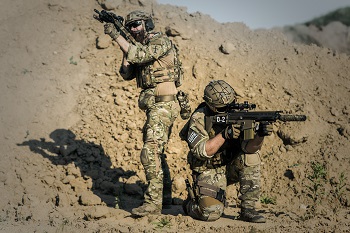U.S. Afghan ‘Experts’ Peddle Recipes for Perpetual War
Michael Hughes
September 3, 2018
New military commander of U.S. forces in Afghanistan Austin Miller on his first day on the job signaled that he would continue America’s stale strategy which itself is a recipe for perpetual conflict. However, there are some so-called strategists who have accomplished the impossible by concocting ideas even worse than the one that has kept the United States in the Afghan quagmire for 17 years.
The prevailing line of thought is that the United States must remain in Afghanistan to prevent another 9/11 and cannot leave until there is some semblance of stability. Miller, during a ceremony in Kabul on Sunday, September 2, reinforced this irrational premise tied to impossible conditions.
“The world recognizes Afghanistan cannot be a safe haven for terrorism,” Miller said. “The world recognizes we cannot fail.”
Former U.S. commander and Ambassador to Afghanistan Karl Eikenberry seems to have seen the light, however, warning that the presence of American troops is part of the problem, not the answer.
“Our soldiers are volunteers, permitting the American people and their elected representatives to be indifferent about the war in Afghanistan,” Eikenbery told the New York Times after the ceremony. “We continue to fight simply because we are there.”
The former envoy also noted that the mission’s goal to “make progress” is divorced from any actions that can deliver sustainable peace.
“Military commanders in Afghanistan, absent political guidance and a diplomatic strategy, have filled the vacuum by waging a war all agree cannot be won militarily,” Eikenberry said.
The ambassador has a point – U.S. war planners and politicians bought and paid for by the defense industry only pay lip service to political dialogue. However, there are some military thinkers who make no pretense about peace talks or ever ending the war.
The White House, keen to political pressure related to the costs of the war in Afghanistan, is mulling a plan to keep U.S. government forces out of harm’s way while maintaining some type of presence on the ground. Blackwater founder Erik Prince is again peddling his plan to privatize the war and reportedly has Dealmaker-in-Chief Donald Trump’s ear.
Prince told NBC in an interview on August 17 that he wants to replace the 15,000 troops and 30,000 war contractors currently operating inside Afghanistan with 2,000 members of U.S. Special Forces and 6,000 contractors.
Prince raised a valid point in noting how much the conflict costs the American taxpayer, citing figures that Washington in fiscal year 2019 alone will spend some $62 billion on the Afghan war.
However, Prince earlier said his scheme for replacing regular U.S. troops with a viceroy-led horde of private mercenaries was based on the British East India model, displaying an enormous disregard and ignorance of history or perhaps he intentionally wanted to evoke imperialistic images of the UK’s nefarious role in Afghan affairs.
The Pentagon has, of course, rejected the idea considering it would shrink the U.S. military footprint in Afghanistan and could even lead to cuts in the defense budget. Yet there is another dubious design, also fashioned with British neocolonialism in mind, being bandied about by warmonger and self-described military historian Max Boot to which the Defense Department might be more amenable.
“The United States won’t achieve its aims in Afghanistan — to keep the country from being overrun by extremists allied with al-Qaeda and other international terrorist groups — through diplomatic sleight of hand,” Boot wrote in an article published in The Washington Post on August 23.
Boot then unveils his American “insurance policy” for Afghanistan – a plan he refers to as the “least bad option” and one the United States should implement with no illusions that a peace settlement is imminent.
“We [the United States] will have to keep 14,000 or so troops there indefinitely, as the British kept troops in the region for 100 years during the 19th and 20th centuries, or we must be prepared for the emergence of another Islamic State-like terrorist state,” Boot asserted.
Freelance writers Sophia Larson and Jerrod Laber, to their credit, pointed out this absurdity in a piece posted by The National Interest by referring to Boot’s very source: The Encyclopedia Britannica, which explains how the British were unable to hold Afghanistan because it was too much of a burden.
Not to mention the fact 4,500 UK and Indian troops and 12,000 followers were massacred during the withdrawal process in 1842. Boot, who fancies himself a historian, certainly knows the tale of the lone survivor, Assistant Surgeon William Brydon, who upon returning to camp when asked where the army was responded: “I am the army.”
Prince’s plan offers Trump a cost-effective face-saving device while Boot’s offers the military a near guarantee of centuries’ worth of occupation. The only thing more frightening than these British imperialistic schemes is that Trump and U.S. military leaders probably think they are viable.

